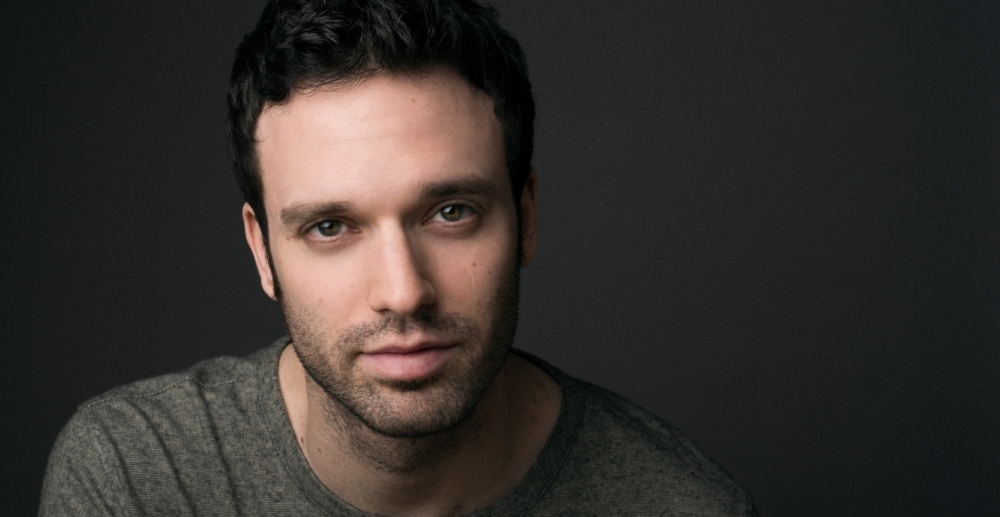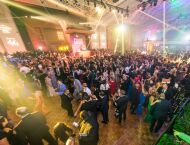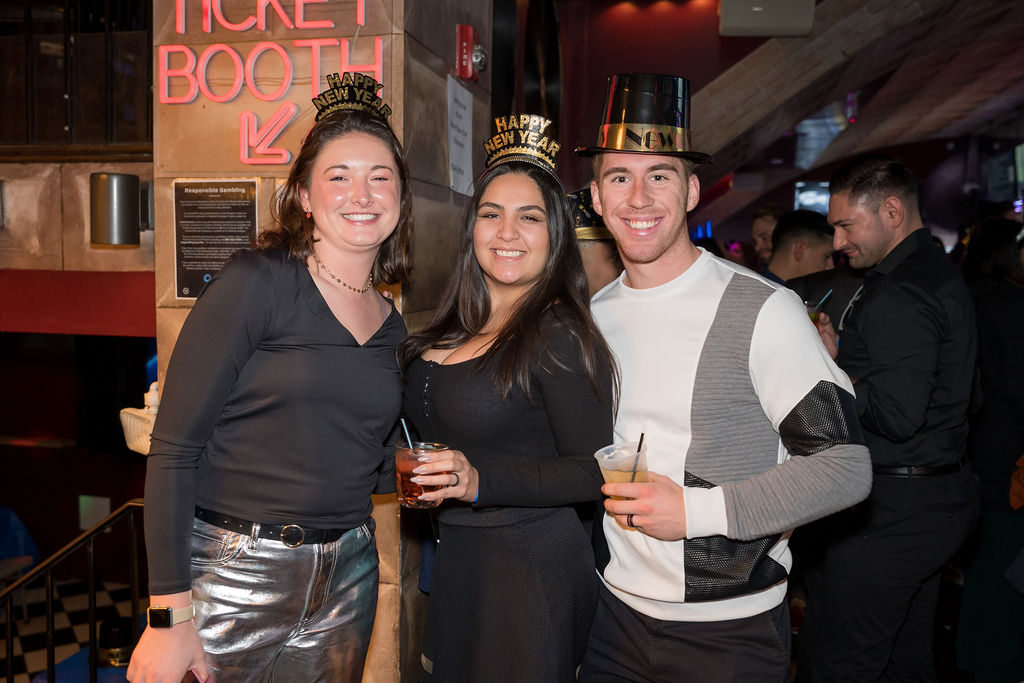Culture
 Jake Epstein // Photo: courtesy of Arena Stage
Jake Epstein // Photo: courtesy of Arena Stage
Jake Epstein Talks World Premiere of Arena Stage’s Dear Jack, Dear Louise
November 26, 2019 @ 12:00am
It can be a challenge for an actor to tap into a character, especially one from a different decade. But for Jake Epstein, playing a WWII soldier holds a special family connection. The former Degrassi star is portraying Jack Ludwig in Arena Stage’s Dear Jack, Dear Louise now through December 29. The play, based on the love story of playwright Ken Ludwig’s parents, is set in the middle of the war and told through the use of letters. We talked to Epstein to learn more about the world premiere of Dear Jack, Dear Louise, long-distance relationships and the DC theatre scene.
On Tap: What’s it like portraying a real-life figure? Especially the playwright’s father?
Jake Epstein: To be honest, I try to block out that I’m portraying the playwright’s father. Only because in the sense of the play, I have to think of it as a character I’m playing. I’m trying to approach it the way I would any play, but certainly, there’s a real responsibility to tell the story right and to make sure the playwright can feel good about it.
OT: How closely did you work with the playwright, Ken Ludwig?
JE: At the beginning, very closely. He’s an amazing and hilarious writer. He was around for all of our table reads where we did a lot of work talking about the history and going on the trip together. Once we got up on our feet and started working with the director [Jackie Maxwell], Ken said “I’m going to let you guys play.” So he kinda went away and he’s been in and out of the whole process.
OT: How did you tap into playing a WWII soldier? What does that era of history mean to you?
JE: When you’re playing somebody from history you try to gather as much information as you can. I’ve done a lot of research, listened to podcasts every day and tried to read what I can so that I feel I can be as authentic as possible. On a personal note, my mother [Kathy Kacer] is a pretty well-known writer and she writes mostly stories about the holocaust for young adults. Her parents, my grandparents, were both Holocaust survivors. My grandmother, I never knew and my grandfather, I only knew a little when I was young. But one of the amazing things about being an actor is that sometimes you’ll get to do a play that’s out of your own time and place, and in this case, getting to do a play during the second world war makes me feel connected to my grandparents.
OT: What books has your mother written about the holocaust?
JE: She’s written over 20 books. My favorite is The Secrets of Gabi’s Dresser, which is a story about my grandmother hiding from the Nazis. Since then, she’s written a lot of other books, one called Clara’s War. They actually use her books in Canada, and I believe they’re starting to in the states, when they’re teaching kids about the second world war in school. That time in history definitely means a lot to me and my family.
OT: Have you visited the Holocaust Museum since you arrived in DC?
JE: I’ve been twice before. I went when I was younger with my parents, and a few years ago when I was here with the national tour of Spring Awakening. I’ve been in intense rehearsal, so I haven’t gotten the chance to do too much in DC but I’m certainly hoping to.
OT: What do you think of the DC theatre scene? How do you like Arena Stage?
JE: I’ll admit that I haven’t seen very much other DC theatre, but I know that it certainly has a great reputation with really smart, savvy audiences. Getting to perform at the Kennedy Center [with the national tour of Spring Awakening] was one of the highlights of my life. It’s such a gorgeous building and it was one of those moments like “oh my god, I’m so lucky that I get to do this.” I mean Arena Stage has this reputation of being this amazing out of town try out. A lot of shows going to New York, Broadway got to try themselves out at Arena Stage. It’s got this real spirit of creativity and support that I’ve been really impressed with. The building is beautiful and its location, with being right on the Wharf, is really cool.
OT: The story revolves around your character Jack and a character named Louise in a long-distance relationship, do you have any experience with long-distance relationships?
JE: Yeah, I do. My wife and I were long distance for about five years before we got married. So I have a lot of experience dealing with long distance and the tragedy, frustration and comedy that goes into maintaining a relationship when you’re far apart from each other.
OT: In today’s world, do you think relationships via letters is still considered romantic or is texting much more practical?
JE: In today’s world, people date through social media and through online dating and texting. It’s a specific part of how people meet and interact. This play is just like the original texting, the original online dating. The difference is just that letters took over a week to get to each other but I love how the play has a sort of wink to where we are today, but with the story of the real history of letters.
OT: Since the play is told through letters, does that change the way you interpret the script as an actor?
JE: Yes and no. Yes, in the sense that the characters are not speaking aloud what they’re saying. They’re expressing the letters that have been written out loud but at the same time, because it’s a play, because it’s a piece of theatre, we really thought to theatricalize the story and theatricalize the way letters can be used on stage. Our director has really encouraged us to make the letters spoken as realistically as possible.
OT: How is being in a world premiere play like Dear Jack, Dear Louise different from being in an established play or TV show, such as Spring Awakening or Degrassi?
JE: Definitely being in a world premiere is a different beat than being in something that is set in stone. The main thing being that the playwright is there so you can talk to him about moments that maybe aren’t working as well as they could. There’s the opportunity for the line tweaks or changes or discussion with what the intention was about certain lines with the person who wrote it. Whereas with a published play, that’s it. You have to make it work. On TV it’s actually similar to a world premiere, the writers are around and there are constant changes on TV. So if anything, being in the world premiere of a play is probably closer to doing a TV show.
OT: Speaking of Degrassi, my editor [Monica Alford] told me she had a big crush on your character. Do you often get recognized for that role?
JE: Tell her thank you very much! I do sometimes and I appreciate it. It makes me laugh every time.
OT: Why do you think Dear Jack, Dear Louise is a great love story? Why will audiences resonate with it?
JE: I definitely hope so. I hope audiences can relate to it. There’s a lot of truth in their love story, it’s a difficult love story. There’s a lot of banter, the two characters couldn’t be more different from each other. Jack is a shy, self-effacing, intelligent army medic who has zero experience with the ladies because he’s been in school his whole life. Louise is this outgoing, charismatic aspiring actress. They couldn’t be more different, yet somehow find each other and start to relate on this very deep personal level through letter writing. They actually have a lot in common and they start to need each other in a way they both didn’t expect. I think there’s a lot of truth in the love story and I certainly related to a lot of it in my own life. I hope audiences feel the same.
Dear Jack, Dear Louise opened November 21 and runs through December 29. Various times. Tickets begin at $41. For more information visit here.
Arena Stage: 1101 Sixth St. SW, DC; 202-488-3300; www.arenastage.org








